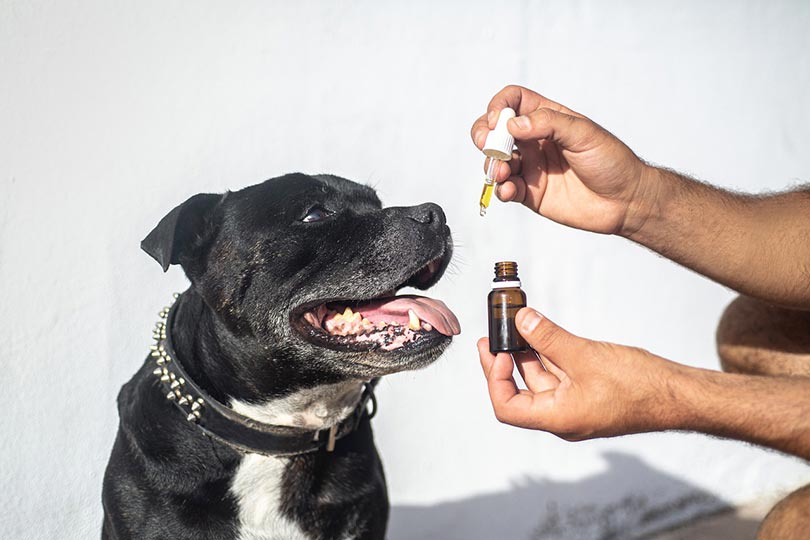If you’ve recently found out your dog has arthritis or you suspect this condition in your dog, you may be wondering how you can help your furry friend cope with the pain. Most arthritis treatments in dogs include NSAIDs (nonsteroidal anti-inflammatories). Many human medications, such as aspirin, are NSAIDs and can be used for treating arthritis, so some pet parents consider giving them to their dogs.
But can you give a dog aspirin for arthritis? Is it a safe thing to do?
Giving aspirin to your dog for arthritis is sometimes okay, but only if it’s necessary and if you’ve previously spoken with your vet about it. Aspirin is not considered an NSAID for dogs, as it could cause toxicity and have side effects. There are safer pain relievers for your furry companion that won’t cause any harm.
Read on to learn more about aspirin and its effect on dog arthritis, dosage, and possible side effects.
What Is Aspirin?
Aspirin is an FDA-approved nonsteroidal anti-inflammatory medication for humans used for relieving pain from various conditions, from minor headaches to arthritis and osteoarthritis. It’s a successful pain reliever for many problems in humans, but it can also cause multiple side effects.

Can I Give Aspirin to My Dog for Arthritis? Is It Safe?
If your furry companion suffers from arthritis, you’ll need to consult your veterinarian to ensure that it’s a safe thing to do and to verify the dosage that you can give your canine. Aspirin is an FDA-approved medication for humans, but it’s not entirely safe for dogs, which is why you need your vet’s approval to use it in the first place.
Aspirin can help relieve pain and discomfort, prevent the formation of blood clots, and decrease fevers and discomfort. It also reduces inflammation and prevents the formation of blood clots, which is why it can be beneficial for dogs with arthritis.
Depending on your dog’s condition, your vet may be okay with using aspirin to treat arthritis, while in other instances, they may prescribe different meds. Also, there are specific cases when your dog shouldn’t consume aspirin. If your dog is sensitive to this medication, uses other meds, is pregnant, or suffers from certain medical problems, they should not consume aspirin.
Confirm with your vet if your dog has a medical condition, but in general, you should never give aspirin to dogs for arthritis if they suffer from one of the following health conditions:
- Liver damage
- Asthma
- Pregnancy
- Allergies
- Cancer
- Ulcers
- Bleeding disorders
Giving aspirin to your dog for arthritis should be done with caution and with approval from your vet. In other situations, it could lead to aspirin poisoning.

Aspirin Poisoning in Dogs
Aspirin is a common NSAID used in both human and veterinary medicine, though it’s only FDA-approved for human usage. When used appropriately and with veterinary supervision, aspirin can help dogs suffering from arthritis by relieving their pain and reducing inflammation.
However, when used inappropriately (without your vet’s approval, without checking the dosage, etc.), aspirin can lead to severe poisoning in dogs. Therefore, it’s extremely important to monitor your dog’s behavior when providing medications such as aspirin.
- Diarrhea
- Vomiting
- Black stool
- Hyperthermia
- Respiratory changes
- Lethargy
- Change in thirst
- Change in urination frequency
- Weakness
- Collapse
- Tremors
- Seizures
- Death
As aspirin side effects could be severe and even fatal, you need to be careful when giving aspirin to your dog for arthritis.

Side Effects of Giving Aspirin to Your Dog
Although aspirin can occasionally be beneficial for dogs with arthritis, it can also cause side effects that may harm your pet. Common side effects of giving aspirin to your dog include:
- Diarrhea
- Vomiting
- Ulceration
- Hemorrhage
- Appetite loss
- Coma
- Seizures
- Black stool
- Death
As aspirin could be deadly for your canine, it’s essential to monitor their behavior to ensure that everything is okay.
Consulting a veterinarian first is recommended for the best course of action.
If you need to speak with a vet but can't get to one, head over to PangoVet. It's our online service where you can talk to a vet online and get the advice you need for your pet — all at an affordable price!
How Much Aspirin Should I Give My Dog?
If your vet approves giving aspirin to your dog for arthritis, be sure to also discuss the dosage. Since aspirin is not FDA-approved for animals, you’ll need to handle the dosage of this medication for dogs with caution. Confirm the precise dosage with your vet to prevent aspirin poisoning. Your veterinarian will likely check if your canine is on any other medication.
Top 2 Aspirin Substitutes for Pain Relief in Dogs With Arthritis
Now that you know that aspirin could potentially be deadly for your dog, you may be wondering about the available aspirin substitutes for pain relief in dogs with arthritis.
Depending on the pain level that your dog has, some veterinarians may prescribe opioids, such as codeine or morphine, especially if the arthritis pain is severe. With their knowledge and experience, the vet should be able to prescribe the best drug to help reduce any arthritis-related problems.
That said, you can try a few natural remedies for dogs.
1. Turmeric
Turmeric contains curcumin, a compound with extraordinary anti-inflammation properties. Many different human studies show the positive effect of curcumin on inflammation, reducing pain and treating various health problems.
Turmeric is a spice that’s safe for canines, meaning you can give turmeric to your dog for arthritis pain. The curcumin reduces inflammation and pain and, most importantly, helps your dog live a comfortable life.
2. CBD for Dogs
Although CBD is not an approved medication for dogs, many pet parents provide their dogs with CBD oil to lower the pain caused by arthritis. It can have a positive effect on your dog and reduce joint pain and inflammation.
However, it’s best to first discuss CBD usage for your dog with your vet to determine if such a treatment would be safe and efficient.

Final Thoughts
Regardless of the condition that your dog is suffering from, never try to treat your furry friend with the medications from your own medicine cabinet. Such a decision should always have your vet’s approval to ensure that your canine won’t suffer from any consequences.
If your veterinarian specifically prescribes aspirin to your dog for arthritis, then you can give it to them. As long as you stick to your vet’s guidelines and the given dosage, your canine shouldn’t experience any problems. Still, remember to monitor your dog’s behavior, and be ready to react if you notice any of the possible side effects.
See also:
- Rimadyl vs Deramaxx for Dogs: Safety, Usage & What To Choose
- What Can I Give My Dog for Pain Relief at Home? 8 Vet-Recommended Options
Featured Image Credit: Jus_Ol, Shutterstock



















